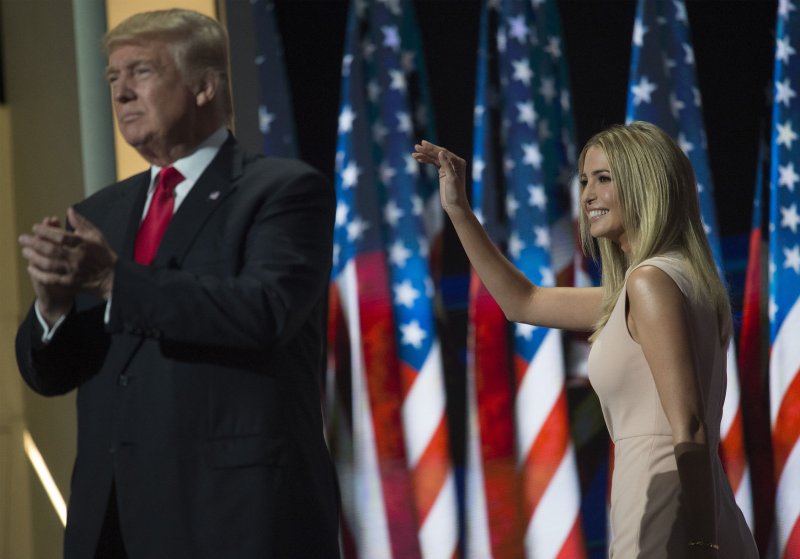1 of 2 | Ivanka Trump waves after delivering the introduction speech for her father Donald Trump at the Republican National Convention in Cleveland on Thursday night. Photo by Pete Marovich/UPI |
License Photo
WASHINGTON, July 25 (UPI) -- Last Thursday evening, in 73 or 74 minutes, Donald J. Trump's valedictory speech masterfully laid out all the reasons why he, the Republican nominee, is unfit for the presidency. Perhaps he should have followed the lead of his daughter Ivanka who introduced him. The 34-year-old Mrs. Jared Kushner combined intellect with poise and charm so much so that if she had been 35 and eligible for the presidency, she might have gotten my vote.
The next day, predictably, Trump's acceptance speech dominated the front, middle and editorial pages of the leading U.S. newspapers. The Washington Post headline read "Trump paints ominous picture"; The New York Times' "His tone dark..." And so the speech was. Turning Ronald Reagan's "morning in America" on its ear, Trump's speech should have been subtitled "the American nightmare."
Citing wrongly an upshot of killings and crime at home against both innocent civilians and law enforcement officers, which cherry picked if not distorted facts, and the dangers and threats posed by "Islamist terror," a phrase he repeated often as a slam against President Barack Obama's refusal to mate Islam with radical violence, Trump painted a grim portrait of the condition of Americans' safety. The same dark views were also attached to an economically challenged nation in which the middle class was evaporating.
The cause of this domestic economic malaise was a "rigged" system. Unlike his wife, Melania, whose speech earlier in the convention was riddled with unacknowledged prose used by Michelle Obama eight years earlier when her husband was nominated, Trump did mention Bernie Sanders, whose message was redolent with "rigging." And Trump was obviously and clumsily trying to woo Democrats and Sanders' supporters with the same message of a rigged system admitting that no one knew "better than me" about how this rigging worked.
As bad as life was in America, Trump was even more negative in his assessment of the international situation. Declaring that he would destroy the Islamic State "quickly," as with his other promises to prevent crime, fix the economy and solve all the pressing problems, solutions and plans were missing in action. Indeed, his fix for the IS of having the best intelligence, halting nation building and suspending immigration from regions of violence until proper vetting could be done was worse than superficial. It was absurd.
The image was of a blonde, orange-haired King Canute demanding that the oceans recede unaware that only the gravitational effects of the moon could accomplish that. But why should science and fact complicate Mr. Trump's promises? Clearly, they do not.
Trump tried to put the NATO toothpaste he had squeezed back into the tube after stating earlier that he might disregard the treaty assurances of Article 5 that "an attack against one was an attack against all" by recognizing that the alliance had taken action over terror. But the screeches of protests from NATO members were shots fired at least partly around the world. My emails were filled with reactions of disbelief from former senior ministers and officials in Europe that Trump could be so detached from reality and dismissive of real allies.
Here are two points to consider. First, compare the Republican convention today with conventions in 1968, 1972 and 1976. For the first, two Kennedys had been assassinated and the U.S. was waging a losing war in Vietnam in which riots wracked the nation. Ditto in 1972 -- except the Democratic nominee George McGovern had to dump his vice presidential running mate Thomas Eagleton after it was revealed he had received electrical shock treatment for mental illness.
In 1976, the nation had endured losing in Vietnam; the resignation of the vice president for bribery and the president over Watergate; the energy crisis and near confrontation with the Soviet Union over the Arab-Israeli October 1973 War; and an economy that was in tatters.
Is today any worse or more dangerous? The answer is of course not. People must understand that.
Second and last, as Walter Mondale once famously asked, "Where is the beef" Mr. Trump? Assertions and guarantees of "I will" have not been matched with any substantial plans of action to achieve these lofty and unachievable promises.
If the Democrats had a candidate who was not so distrusted, the election would be a foregone conclusion and possibly the greatest blowout since 1964 when LBJ demolished Barry Goldwater. Instead, the unachievable is running against the merely unacceptable.
Shame on us.
Harlan Ullman is UPI's Arnaud de Borchgrave Distinguished Columnist and serves as senior adviser for Supreme Allied Commander Europe, the Atlantic Council and Business Executives for National Security and chairs two private companies. His last book is "A Handful of Bullets: How the Murder of Archduke Franz Ferdinand Still Menaces the Peace." His next book, due out next year, is "Anatomy of Failure: Why America Loses Wars It Starts."















